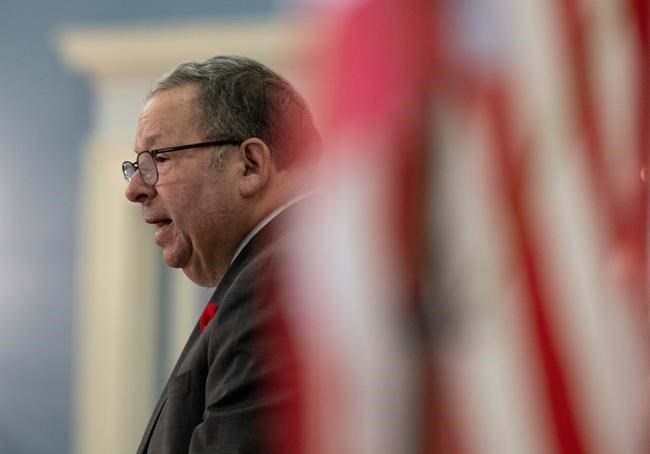OTTAWA — A "big fight" between Canada and the United States could be looming over the federal Liberal government's plan to impose what Washington's envoy to Ottawa described Tuesday as a "discriminatory" tax on digital services.
David Cohen, whose nearly two years as U.S. ambassador have been marked by friendly but frank and sometimes blunt talk about cross-border concerns, issued the warning after a luncheon speech hosted by the Canadian Club of Ottawa.
"That will be an area of contention unless it is resolved," Cohen told his audience when the subject of Canada's digital services tax came up during the question-and-answer session.
"There's a place where we're either going to have to have agreement, or we're going to have a big fight."
The tax — a three per cent levy aimed at foreign companies, many of them based in the U.S., that derive revenue from Canadian subscribers and contributors — is scheduled to take effect in January, retroactive to 2022.
The measure was put in place as a failsafe of sorts to backstop a collective effort by G20 countries and the Organization for Economic Co-operation and Development to come up with their own global digital taxation framework.
So far, that hasn't happened — but Finance Minister Chrystia Freeland, who was in D.C. for meetings earlier this month to talk critical minerals with her U.S. counterparts, hinted at progress on Tuesday.
"We did have some good conversations about the DST, including at (the) officials level," Freeland said. "I remain cautiously optimistic that we'll be able to reach an understanding with our American partners."
Cohen was far from combative in his own remarks, noting that the U.S. understands Canada's position, but is simply asking the government to allow more time for the OECD framework to fall into place.
Both Canada and the U.S. want to see the OECD framework up and running sooner rather than later, he said — but the alternative, a "country-by-country" approach in which the U.S. is disproportionately hit, wouldn't be fair.
"The United States thinks digital services taxes are discriminatory against United States companies," Cohen said. "What the United States has asked ... is for an additional year or two to try and put the OECD framework in place."
The prospect of Ottawa imposing a digital tax on an industry that's heavily concentrated south of the border has been steadily gaining traction in Washington as a significant irritant in Canada-U.S. relations.
Last month, members of the powerful House Ways and Means Committee, which oversees matters of international trade, wrote to warn of "significant consequences" if Canada proceeds with the tax.
"Canada's unusually aggressive and discriminatory approach would target U.S. companies and workers who would disproportionally bear the burden of this new tax," they wrote.
The letter, addressed to both Treasury Secretary Janet Yellen and U.S. Trade Representative Katherine Tai, was co-signed by an array of 41 committee members, Democrats and Republicans both.
It also called into question whether the measure would constitute a violation of Canada's obligations under the U.S.-Mexico-Canada Agreement or its commitments to World Trade Organization treaties.
"Given our prolific trading relationship with Canada, its retroactive DST proposal would be especially damaging to U.S. industry and workers."
The letter noted that the vast majority of OECD countries working on the issue have agreed to extend their own timeline to the end of 2024.
Prior to a key bilateral meeting in Ottawa earlier this year between Joe Biden and Justin Trudeau, industry lobbyists urged the U.S. president to take a hard line on the issue with his Canadian counterpart.
Canada's position, they warned, would set a "harmful precedent" for other countries taking part in the OECD effort that might be inclined to follow the Canadian lead and impose taxes on U.S. digital services.
The two leaders will have a chance to discuss the matter in person on Friday, when Cohen said Trudeau will be in the U.S. capital to take part in a mini-summit on trade and irregular migration being hosted by the White House.
This report by The Canadian Press was first published Oct. 31, 2023.
— By James McCarten in Washington, D.C., with files from Dylan Robertson in Ottawa.
The Canadian Press



